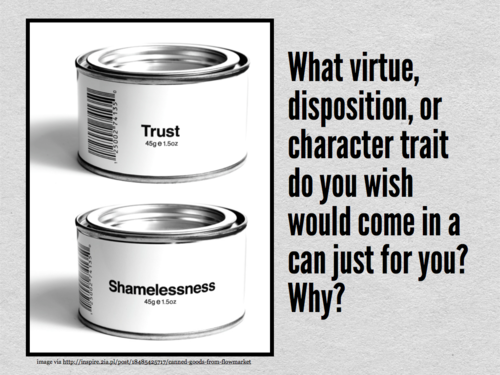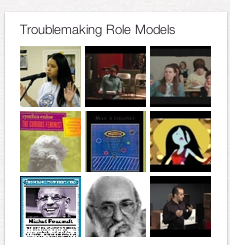Disclosure: STA, FWA, RJP and I have been watching a lot of Star Wars lately. And last night, we went to the Twins, “May the 4th be with You” baseball game. Therefore, when I read the line, “these are the people we are looking for” in David Brooks latest book, The Road to Character, I couldn’t resist giving this entry the above title, “These are not the Exemplars You’re Looking For.” I guess I’m even tempted to edit the date on this entry so that it’s from yesterday (May 4th) instead of today. Sigh. But I won’t.
Simmering in the back of my brain has been my feminist/queer virtue project. I’ve been writing about it for years. Is it finally time to do something more substantial about it? Possibly. For today, I’ll just keep thinking and writing about virtue ethics on my blog.
I’m inspired to re-visit my thoughts on virtue ethics today. Partly because I recently re-designed my Undisciplined site (and this TROUBLE site too) and created a space for my research on virtues. But mainly because I want to write about David Brooks’ book, The Road to Character. I checked it out of the library and am reading it because I’m interested in critically analyzing how moral character gets represented in pop culture. (note: I begin my reading with a skepticism towards Brook’s project, but also with a desire to be capacious in my reading of his ideas).
So far, I’ve made it through the introduction, which includes a discussion of the differences between “résumé virtues” (the skills that you put on your resume that symbolize external success) and “eulogy virtues” (the virtues that people talk about at your funeral that demonstrate inner strength of character). I want to say more about this distinction at some point, especially how it compares and contrasts to practical and moral wisdom in Aristotelean virtue ethics. But quickly: Brooks’ framing of this distinction still seems to be about how others view you as a successful person, whether it be in achieving an impressive career or an impressive soul. This framing seems to stay within the logic of the résumé virtues.
I wasn’t planning to write about this book yet, since I barely started it and I only have 10 minutes before I pick up my daughter from school, but…I had to post something when I read Brooks’ description of the moral exemplars that WE (consistently he speaks for us in this introduction, invoking “we” and “You” constantly) need and want. Here’s what he writes:
Occasionally, even today, you come across certain people who seem to possess an impressive inner cohesion. They are not leading fragmented, scattershot lives. They have achieved inner integration. They are calm, settled, and rooted. They are not blown off course by storms. They don’t crumble in adversity. Their minds are consistent and their hearts are dependable….Sometimes you don’t even notice these people, because while they seem kind and cheerful, they are also reserved. They possess the self-effacing virtues of people who are inclined to be useful but don’t need to prove anything to the world: humility, restraint, reticence, temperance, respect, and soft self-discipline….They radiate a sort of moral joy. They answer softly when challenged harshly. They are silent when unfairly abused. They are dignified when others try to humiliate them, restrained when others try to provoke them.
He concludes:
These are the people who have built a strong inner character, who have achieved a certain depth…These are the people we are looking for (xvi-xvii).
While I don’t disagree entirely with his ideas here, I feel compelled to state that the people Brooks’ describes, these examples of how to build a deep character, are not the moral exemplars that I’m looking for. They might be the ones he’s looking for, but he shouldn’t presume to speak for everyone else and what examples they need in their lives. Not only does his vision for US leave a lot of exemplary people out of the mix, but it leaves a lot of moral practices out of the vision of what it means to be moral.
A few random, and perhaps disjointed, responses to Brooks’ claim:
- What about moral rage?
- How does social injustice fit into Brooks’ vision of moral character?
- Does sacrifice and humility ever prevent folks from developing their moral characters? (Implied answer: YES!)
- What is “soft self-discipline”?
Before offering one more response to Brooks’ vision of moral exemplars, I want to add that this is only Brooks’ introduction to these individuals who exemplify good character. The bulk of the book is about discussing these different people. So, I’m open (and eager) to see how he describes his qualities of character (virtues) and the people who exemplify them (role models).
Okay, here’s a final thought (at least for this post) on Brooks’ praising of the kind, humble, polite, restrained and cheerful exemplar of the “eulogy virtues.” I originally posted the following on my blog a few years ago:
This image is inspired by some theories/ideas that aim to resist the demand to have a positive attitude and just be happy. Here are a few passages from these theories that might enable you to engage with and make sense of the image and my motivations.
SMILE OR DIE!
This phrase is a reference to Barbara Ehrenreich’s talk for RSA Animate (see transcript here). In this talk, she critiques “the ideology of positive thinking,” in which people are encouraged expected to have a positive attitude, act as if “there’s nothing wrong” and “just put a smiley face and get on with it.” The problem with this “delusion of positivity” is that it conceals or suppresses any dissent to or questioning of the larger structures that create conditions for our unhappiness. She says:
What could be cleverer as a way of quelling dissent than to tell people who are in some kind of trouble – poverty, unemployment etc – that it’s all their attitude, you know that that’s all that has to change, that they should just get with the programme, smile and no complaining. It’s a brilliant form of social control
So, the command to “smile or die!” is also a demand to not question, not worry and not think about why it might sometimes be good to not be happy. Now, Ehrenreich is not against joy or expressing/experiencing happiness. Instead, she’s against the larger ideology of positive thinking that demands that we suck it up, don’t complain, be cheerful and spread our good feelings to others.
KILLJOY
This idea of spreading good feelings and the ideology of positivity is one of the central themes in Sara Ahmed’s The Promise of Happiness. This book and Ahmed’s critique of the “happiness industry” are big inspirations for my image. I’ve written about the feminist killjoy in past posts. Here’s one of my favorite passages from Ahmed about the feminist killjoy:
Say, we are seated at the dinner table. Around this table, the family gathers, having polite conversations, where only certain things can be brought up. Someone says something you find problematic. You respond carefully, perhaps. You might be speaking quietly, but you are beginning to feel “wound up,”recognizing with frustration that you are being wound up by someone who is winding you up. Let us take seriously the figure of the feminist killjoy. Does the feminist kill other people’s joy by pointing out moments of sexism? Or does she expose the bad feelings that get hidden, displaced or negated under public signs of joy?
The killjoy is someone who refuses to just smile and be happy. Who is willing to be angry or worried or unhappy. Or who will always necessarily fail at being happy in the ways that are demanded of them (ways that usually include a narrow heteronormative/capitalist future and that require living within and therefore reinforcing certain norms).
I JUST WANT YOU TO BE HAPPY
Throughout the book, Ahmed reflects on a phrase that she repeatedly heard as a child: “I just want you to be happy.” She’s particularly interested in the “just want” of this phrase and its implications for thinking through how we understand our own happiness to be tied to others and their willingness to go along with what we imagine to be the right kind of happiness. In describing how this phrase gets uttered, she writes:
We can imagine the speaker giving up, stepping back, flinging up her arms, sighing. I just. The “just” is a qualifier of the want and announces a disagreement with what the other wants without making the disagreement explicit.
To exclaim that you “just want” someone to be happy is not simply to disagree with their approach; it is to claim that their approach will only lead to unhappiness and is therefore bad or not the “right” way to live. And it is to ignore or actively suppress their vision of happiness and joy all for the sake of their “true” happiness.
In my lecture notes from a Queering Desire course that I taught in 2010, I discuss what it means to be happy in the “right” way:
the very hope for happiness means we get directed in specific ways, as happiness is assumed to follow from some life choices and not others” (54).
What life choices are supposed to lead to happiness and which are not? Who gets to decide what leads to happiness and how are those decisions made?
The face of happiness, at least in this description, looks rather like the face of privilege. Rather than assuming happiness is simply found in “happy persons,” we can consider how claims to happiness make certain forms of personhood valuable (11).
Promoting happiness promotes certain ways of living (over others) and certain types of families (11).
“Ideas of happiness involve social as well as moral distinctions insofar as they rest on ideas of who is worthy as well as capable of being happy ‘in the right way'” (13).
A GOOD GIRL?
In May, I wrote about the problems with being a “good girl” in my post, On assholes, douche bags and bullshitters:
In “A Response to Lesbian Ethics,” Marilyn Frye (rightly) asks, “Why should one want to be good? Why, in particular, would a woman want to be good? (56). Her short answer: you shouldn’t. Her longer answer: The demand to be a good girl is intended to keep women in line, to pit them against each other–the “good girls/ladies” vs. “the bad/rebellious women,” and to prevent them from challenging dominant systems of power and privilege.



